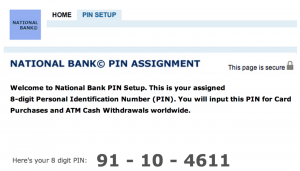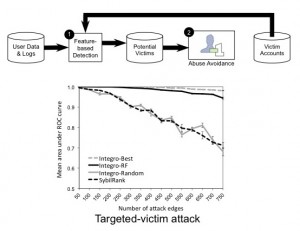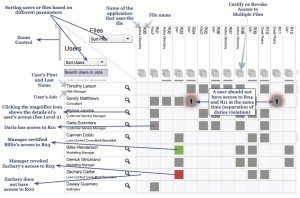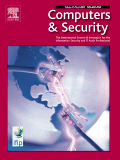To ensure that users do not choose weak personal identification numbers (PINs), many banks give out system-generated random PINs. 4-digit is the most commonly used PIN length, but 6-digit system-generated PINs are also becoming popular. The increased security we get from using system-generated PINs, however, comes at the cost of memorability. And while banks are increasingly adopting system-generated PINs, the impact on memorability of such PINs has not been studied.

In a collaboration among Honeywell ACS Labs, Sungkyunkwan University, Oregon State University, University of Illinois at Urbana-Champaign, and UBC, we conducted a large-scale online user study with 9,114 participants to investigate the impact of increased PIN length on the memorability of PINs, and whether number chunking techniques (breaking a single number into multiple smaller numbers) can be applied to improve memorability for larger PIN lengths. Our findings have been reported at SOUPS ’15.As one would expect, our study shows that system-generated 4-digit PINs outperform 6-, 7-, and 8-digit PINs in long-term memorability. Interestingly, however, we find that there is no statistically significant difference in memorability between 6-, 7-, and 8-digit PINs, indicating that 7-, and 8-digit PINs should also be considered when looking to increase PIN length to 6-digits from currently common length of 4-digits for improved security.
By grouping all 6-, 7-, and 8-digit chunked PINs together, and comparing them against a group of all non-chunked PINs, we find that chunking, overall, improves memorability of system-generated PINs. To our surprise, however, none of the individual chunking policies (e.g., 0000-00-00) showed statistically significant improvement over their peer non-chunked policies (e.g., 00000000), indicating that chunking may only have a limited impact. Interestingly, the top performing 8-digit chunking policy did show noticeable and statistically significant improvement in memorability over shorter 7-digit PINs, indicating that while chunking has the potential to improve memorability, more studies are needed to understand the contexts in which that potential can be realized.
For more details, read the paper.
How Much Can Chunking Help to Remember Banking PINs?
Touch ID: How Does It Affect iPhone Security?
Recently, Apple has introduced Touch ID, which allows a fingerprint-based authentication to be used for iPhone unlocking.

It’s positioned to allow users to use stronger passcodes for locking their iOS devices, without substantially sacrificing usability. It is unclear, however, if users take advantage of Touch ID technology and if they, indeed, employ stronger passcodes. In order to answer this question, at LERSSE, we conducted three user studies through which we found that users do not take an advantage of Touch ID and use weak unlocking secrets. To our surprise, we found that more than 30% of the participants did not know that they could use passwords instead of 4-digit PINs. Some other participants indicated that they adopted PINs due to better usability, in comparison to passwords. Most of the participants agreed that Touch ID, indeed, offers usability benefits, such as convenience, speed and ease of use. Finally, we found that there is a disconnect between users’ desires for security that their passcodes have to offer and the reality. In particular, only 12% of participants correctly estimated the security their passcodes provide.
Find more details in our SOUPS ’15 paper.
Improving Detection of OSN Fakes by Predicting Victims
LERSSE student Yazan Boshmaf (co-supervised with Matei Ripeanu) has presented at NDSS last part of his Ph.D. research, Integro.

It helps OSNs detect automated fake accounts using a robust user ranking scheme. The key idea is based on an insight that victims, benign users who control real accounts and have befriended fakes, form a distinct classification category that is useful for designing robust detection mechanisms. As attackers have no control over victim accounts and cannot alter their activities, a victim account classifier which relies on user-level activities is relatively hard to circumvent. Moreover, as fakes are directly connected to victims, a fake account detection mechanism that integrates victim prediction into graph-level structures can be more robust against manipulations of the graph.Integro starts by predicting victim accounts from user-level activities. After that, it integrates these predictions into the graph as weights such that edges incident to predicted victims have lower weights than others. Finally, Integro ranks user accounts based on a modified random walk that starts from a known real account. Integro guarantees that most real accounts rank higher than fakes so that OSN operators can take actions against low-ranking fake accounts. We implemented Integro using widely-used, open-source parallel computing platforms in which it scaled nearly linearly. We evaluated Integro against SybilRank, the state-of-the-art in fake account detection, using real-world datasets and a large-scale deployment at Tuenti, the largest OSN in Spain. In particular, we show that Integro significantly outperforms SybilRank in user ranking quality, with the only requirement that the used victim classifier is better than random. Moreover, the deployment of Integro at Tuenti resulted in an order of magnitude higher fake account detection precision, as compared to SybilRank.
For more details, read the paper.
Improving Access Review with AuthzMap
Research led by LERSSE Ph.D. student Pooya Jaferian will be featured at SOUPS this July. By interviewing IT professionals, he has explored access review activity in organizations, and then modeled access review in the activity theory framework. The model suggests that access review requires an understanding of the activity context including information about the users, their job, their access rights, and the history of access policy. Guidelines of the activity theory were used to design a new user interface, AuthzMap, which was compared to two state of the practice. The experiments demonstrated that AuthzMap improved the efficiency of access review most scenarios. Read the full paper for details.

Serving on Computers & Security Editorial Board

As of January 2014, I’m serving on the editorial board of Elsevier’s Computers & Security journal. Apparently, it is the official journal of Technical Committee 11 (computer security) of the International Federation for Information Processing (IFIP). The journal is in its 29th year, which makes it one of the oldest archival publications in the field of computer security. One of the main goals of the editorial board nowadays is to arrange quality reviews with quick turn-around.